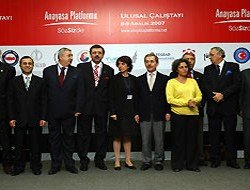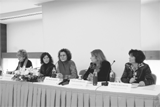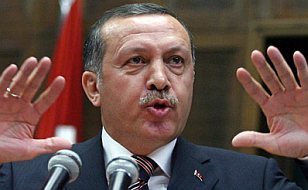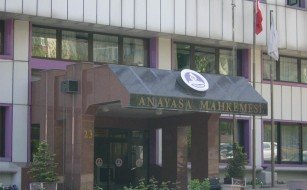After "national workshops" in Ankara on 8 and 9 December, the "Constitutional Platform Initiative" yesterday (13 December) published a shared memorandum. In its introduction, it reads:
"Although there were differing opinions on some of the issues discussed, it can be said the principles below are the result of compromise. Compromise must not be confused with total agreement. The basic aim of the national workshop was to involve civil societies in the process of shaping the constitution."
Some of the principles agreed on were:
Equality, freedoms and rights
- The clause that all citizens are equal before the law must be preserved and discrimination must not be allowed for any reason.
- Following international agreements, the rights of the handicapped, the old and children must be safeguarded as a priority.
- The constitution must take measures in order that the equality of men and women is practically realised. Therefore, "positive discrimination" must be used, particularly in the social and political arena.
- There must be no limitations in basic rights and freedoms which would violate the agreements on basic rights and freedoms which Turkey has signed.
- The freedoms of thought, expression and the press must be guaranteed effectively.
- Pre-school education and a minimum of 12 years education must be obligatory. Everyone must be able to use this right equally and without paying.
- Employees in the public sector must be allowed the right to group contracts, strikes and trade union rights.
- All employees must have equal rights to social security.
- The relations between voters and representatives must be strenghtened.
- The electoral threshold must be rearranged in order to create justice in representation.
- There must be clauses which encourage political participation of individuals and civil society organisations.
- Public employees must have the right to be involved in politics.
- The division of powers must be restructured in order to prevent the dominance of one over the other.
- The immunity of MPs must be limited to immunity concerning what they say.
- The powers of the president must be reduced.
- Local government must be strenghthened.
- There must be scientific, financial and administrative autonomy at universities.
- Issues concerning judges and prosecutors must be dealt with by the Supreme Council of Judges and Prosecutors (HSYK).
- The HSYK must not become involved in politics.
- The defense counsel must be protected by the constitution.
- Public accountability must become institutionalised in the constitution.
- Local authorities, NGOs and professional associations must be given the right to appeal to the Constitutional Court.
- The state must take measures in order to provide an effective state support system.
- All budgets using public resources must be accounted for. (GG/TK)















